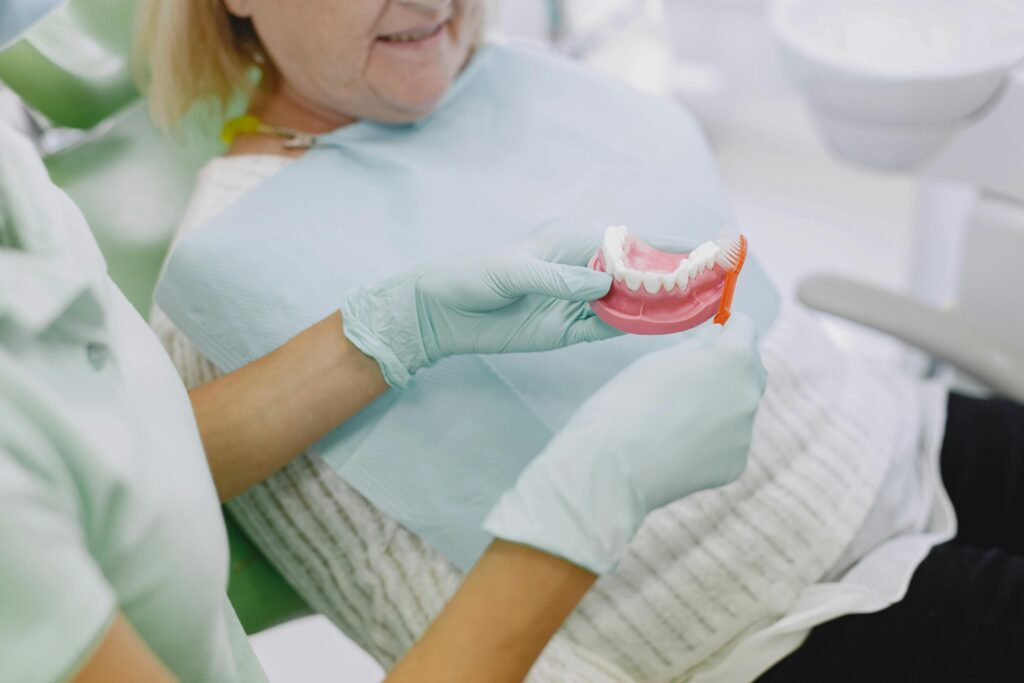If you have been dealing with broken or missing teeth, your dental specialist may already have suggested that you opt for partial or full dentures. If this is the case, you may be wondering what the care process involves.
Investing in the dentures Mornington specialists recommend is only one of several dental solutions that will help restore functionality to your mouth. Eating, speaking, and improving your smile are a few of the benefits that you can look forward to. However, correct maintenance is essential to ensure that your dentures remain durable and functional.
Understanding How Dentures Work
You may already know someone who has opted for full or partial dentures. If not, here’s a quick look at what they are and what you can expect from them. In short, both full and partial dentures are removable replacements for all or partially missing teeth.
Dental technicians construct dentures from a variety of materials such as acrylic, resin, porcelain, and even nylon. Here’s how partial and full dentures differ:
- Partial dentures: At their core, partial dentures replace a few or several missing teeth in the top and bottom jaw. Partial dental solutions rely on the strength of underlying bones and gums for support. These dentures feature special clasps that easily hook around your natural teeth to provide constant stability and hold them in place.
- Full dentures: Sometimes referred to as complete dentures, these solutions replace all the teeth in your mouth. They are a popular option for anyone who has more missing teeth than whole ones left. These solutions rest on top of your gums and depend on the roof of your mouth or lower jawbone for support. Sometimes denture adhesives are added to hold the dentures in place. Dentures are typically removed at night to allow the gums to rest. At this time, dentures are also soaked in a cleaning solution that removes more bacteria than simple rinsing would.
Make Ongoing Care a Priority
If you’ve been struggling with missing or broken teeth, then your new dentures will feel like a new lease on life for your mouth. While dentures are made to last for years, they still require proper maintenance and care to keep them as functional as possible for as long as possible. The good news is that denture care is easier than you think. Here’s what you need to know.
1. Maintain Your Regular Dentist Visits
Getting new teeth may leave you feeling as though your dental issues are resolved. This may be true if your dental problems were not severe to begin with. Your dental specialist may also have removed other damaged and problem-causing teeth to accommodate your dentures.
It’s essential to keep in mind that you should still maintain your regular dental visits. This is crucial to ensure that your dentures fit perfectly and that there is no rubbing against your gums. Your dentures also shouldn’t move around when you eat or be painful. Regular visits to your dentist allow your specialist to check for other gum or bone density issues.
2. Handle Your Dentures Carefully
Dentures are strong and can handle daily use in your mouth. They can, however, break or crack if you accidentally drop them. Fixing or replacing dentures can be costly, and wearing damaged dentures can cause damage to your mouth or gums. Avoid this by treating them with care. So rather than make the effort to treat them with care.
Start this process by standing over a basin of water or a folded towel when handling your dentures to ensure they don’t fall on a hard surface. Use a clean, airtight container to keep them in when they’re not in your mouth or in a glass of water.
3. Develop a New Cleaning and Care Routine
Once you receive your new dentures, your next step is to develop a new dental care routine. This involves cleaning your teeth every day, the way you would care for your original teeth. Follow these simple cleaning tips to keep your dentures healthy and strong:
- Use a non-abrasive cleaner such as the specialized denture cleaners you can buy from your local grocery store. Apply the cleaner with a soft-bristle toothbrush and rinse them thoroughly after brushing.
- Invest in a denture soak that you can place your teeth in at night. This will remove bacteria and food particles that regular brushing may not. Brush and rinse teeth after soaking before wearing them again.
- Avoid hard or sticky foods that can damage your new teeth. Cut food into smaller, bite-sized chunks that are easier to chew.
- Rinse your teeth after eating foods that can cause staining. Beetroot, wine, and coffee are common examples of this.
Final Thoughts
Dentures are an excellent solution for missing or broken teeth. Proper care and maintenance are required to ensure your new teeth remain strong and durable. Our expert tips will make denture care simple and easy enough for you to do as part of your oral hygiene routine. You’ll soon see that your new smile is easier to care for than you may have anticipated!





